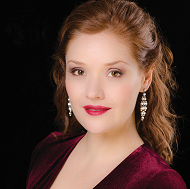|
Back
An engaging discovery Toronto
The Jane Mallett Theatre
02/16/2020 -
Charles M. Wilson: Kamouraska
Jennifer Taverner (young Elizabeth d’Aulnières), Jennifer Routhier (old Elizabeth Rolland), Matt Chittick (Antoine Tassy), Cairan Ryan (Dr. George Nelson), Diana Di Mauro (Aurélie Caron), Daniela Agostino (Aunt Angélique), Meghan Symon (Aunt Luce-Gertrude), Karen Bojti (Aunt Adélaïde), Gregory Finney (Jérôme Rolland), Joseph Wong (Court Clerk, Priest), Taylor Gibbs (Ignace, Blanchet, Medical Student), Charlotte Stewart-Juby (Rose Morin), Joshua Cleminger (Letelier), Anika-France Forget (Mme Dufour), Sean Curran (Michaud, Dr. Douglass), Kyle Merrithew (Robert)
Ensemble, Robert Cooper (Conductor)
Guillermo Silva-Marin (Dramatic Advisor and Lighting Designer)

J. Taverner
Charles Wilson (1931-2019) composed his opera Kamouraska based on Anne Hébert’s 1970 novel which was also, soon after its publication, made into a well-received movie. The composer had his Heloise and Abelard performed by the Canadian Opera Company in 1973. Kamouraska was his next project but, since the COC had only limited resources to produce new operas, the score was put aside. Decades later Guillermo Silva-Marin, general director of Voicebox Opera in Concert, discovered it in the library of the Canadian Music Centre. He asked Wilson if he would compose a reduction for a smaller orchestra considering the relatively modest resources (and smallish venue) of the organization. Charles Wilson agreed, and Voicebox premiered it in 2009. This was the work’s second outing.
It is actually quite an ambitious piece, with a cast of 16 singers. There is no chorus and the orchestral ensemble has 14 players (four strings, eight wind instruments, percussion, and piano). The action of the work follows the sequence of the novel, thus starting some 18 years after the climax of the drama, a murder. The murdered man’s widow recalls her earlier life in a series of random flashbacks. This sounds as if it would be confusing to follow but, thanks to a concise libretto (the composer’s own), appropriate casting, adroit semi-staging, and surtitles, the plot emerges with clarity. The music percolates engagingly, with two acts of about 45 minutes each. (The intermission is a bit awkward, but it turns out to be a helpful to take a break and get a handle on what is happening.)
The plot is inspired by a criminal case that occurred in Lower Canada (now the province of Quebec) in the 1830s.
The middle-aged Elizabeth d’Aulnières, now Madame Rolland and nursing her husband through a terminal illness, reminisces about her youthful life with three doting aunts and a world-wise maid, Aurélie. She is pushed into marriage at age 15 (not unusual at the time) to an affluent man, Antoine Tassy, who has inherited a sizable property, a seigneury called Kamouraska on the south shore of the St. Lawrence River. He turns out to be a brutal, philandering husband with a fixation on suicide. Elizabeth is ill after the birth of their third child and Antoine calls for the services of an old school friend who is now a doctor, George Nelson. He diagnoses too-frequent pregnancies (also not unusual at the time) and notices her bruises. They begin a love affair which is difficult in a small, rural community, although one of her aunts is happy she has found a better man than her husband. The situation becomes more fraught and Elizabeth and George concoct a plot to kill Antoine: through a combination of bullying and seduction, they persuade Aurélie to poison Antoine’s wine. This she does, but he survives. Then George takes matters in hand and murders Antoine, burying his remains in the snow. His body is soon found and there were witnesses to revealing aspects of the deed, such a blood in George’s sleigh. George flees to the USA and Elizabeth and Aurélie are charged. Aurélie confesses everything, but Elizabeth and her very proper aunts manage to discredit the maid’s testimony.
The plot resembles the précis of a novel by Flaubert or Balzac, or the synopsis of a lurid, verismo opera. It would have been red meat for, say, Mascagni. Charles Wilson’s orchestral music is more atmospheric that anything else; there is a good deal of spoken dialogue that evolves into pitched speech and then brief passages of singing. If there are no extended set-oieces, there are also no longuers. The closest thing to an aria is a brief monologue for Antoine that helps illustrate what a lurching mess his life has become. There is also a brief party scene that conjures up a raucous festivity but without quoting anything from the period. If there is any flaw it is that the wind instruments’ accompaniment can get a bit too insistent; the timbre of voices and such instruments can tangle together awkwardly. Still, for the most part, the effect is like that of a painter’s quick, light brush strokes giving us just enough information to perceive the full picture.
As we have become accustomed to expect from Voicebox, the cast is well-chosen. Mezzo-soprano Jennifer Routhier displays an exceptionally lush voice as the elder Elizabeth, while soprano Jennifer Taverner ably carries the main role, that of the younger Elizabeth. As for the two main male roles, tenor Matt Chittick (Antoine) and baritone Cairan Ryan (George Nelson) firmly establish their characters within the taut lines assigned to them.
Notable in smaller roles are Diana Di Mauro as the maid, Aurélie Caron, and Karen Bojti as the “warm and understanding” Aunt Adélaïde. On the male side, young Joseph Wong stands out as the declamatory court clerk. Once again conductor Robert Cooper maintains a steady hand on a score with ever-shifting episodes.
It is hard to tell how legible this work would be if placed in a larger context as originally envisioned. As it stands, at least in this instance, it turns out to be a surprisingly engaging chamber opera.
Michael Johnson
|